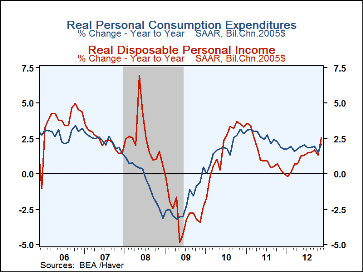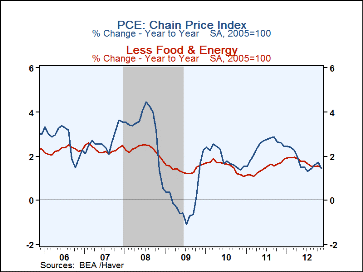 Global| Dec 21 2012
Global| Dec 21 2012U.S. Income, Spending & Savings Each Improved Last Month
by:Tom Moeller
|in:Economy in Brief
Summary
November was a better month for individuals' income & outlays. Personal income grew 0.6% last month following an unrevised 0.1% October uptick. A 0.3% rise was expected. The gain was the strongest since February and lifted the y/y [...]
 November was a better month for individuals'
income & outlays. Personal income grew 0.6% last month following an
unrevised 0.1% October uptick. A 0.3% rise was expected. The gain was the
strongest since February and lifted the y/y increase to an improved 4.1%.
A strong 0.6% rise (3.7% y/y) in wage & salary income provided lift to
income last month. Proprietor's earnings also rose a firm 0.7% (5.2% y/y).
Interest income grew 2.0% (0.9% y/y), about the same as it did in October,
and earnings from dividends gained 0.8% (8.8% y/y). Disposable income rose
a similar 0.6% (4.0% y/y) and adjusted for the decline in prices, take
home pay rose 0.8% (2.5% y/y).
November was a better month for individuals'
income & outlays. Personal income grew 0.6% last month following an
unrevised 0.1% October uptick. A 0.3% rise was expected. The gain was the
strongest since February and lifted the y/y increase to an improved 4.1%.
A strong 0.6% rise (3.7% y/y) in wage & salary income provided lift to
income last month. Proprietor's earnings also rose a firm 0.7% (5.2% y/y).
Interest income grew 2.0% (0.9% y/y), about the same as it did in October,
and earnings from dividends gained 0.8% (8.8% y/y). Disposable income rose
a similar 0.6% (4.0% y/y) and adjusted for the decline in prices, take
home pay rose 0.8% (2.5% y/y).
Improved earnings were all it took to power the dollar value of personal consumption expenditures. An expected 0.4% (3.5% y/y) rise followed a revised 0.1% October slip, initially reported as -0.2%. A 0.1% increase had been expected. Adjusted for lower prices, spending jumped 0.6% (2.1% y/y), the largest monthly gain since August 2009. Strength in new vehicles purchases, up 5.6% (10.7% y/y), as well as a 0.9% increase (3.9% y/y) in furniture & durable household equipment powered the overall rise. Clothing consumption also gained a real 1.4% (2.2% y/y) but spending on services increased just 0.3% (1.3% y/y).
As growth in income outpaced the rise in spending, the personal savings rate rose to 3.6% from 3.4% in October. For the last year, the rate moved roughly sideways.
The PCE chain price index fell 0.2% (1.4% y/y) as gasoline prices were down 6.8% (+2.0% y/y). Also lower were food & beverage prices, by 0.5% (+2.0% y/y). Less food and energy, the PCE chain price index was unchanged (1.5% y/y). Durable goods prices were off another 0.2% (-1.7% y/y) as recreational goods prices fell 0.5% (-5.9% y/y). Motor vehicle costs ticked up 0.1% (0.5% y/y), furniture prices were unchanged (-0.1% y/y) and clothing prices dropped 0.5% (+2.0% y/y).
The personal income & consumption figures are available in Haver's USECON and USNA databases. The consensus expectations figures are in the AS1REPNA database.
| Personal Income & Outlays (%) | Nov | Oct | Sep | Y/Y | 2011 | 2010 | 2009 |
|---|---|---|---|---|---|---|---|
| Personal Income | 0.6 | 0.1 | 0.4 | 4.1 | 5.1 | 3.8 | -4.8 |
| Wages & Salaries | 0.6 | -0.3 | 0.4 | 3.7 | 4.0 | 2.1 | -4.3 |
| Disposable Personal Income | 0.6 | 0.1 | 0.4 | 4.0 | 3.8 | 3.8 | -2.7 |
| Personal Consumption Expenditures | 0.4 | -0.1 | 0.8 | 3.5 | 5.0 | 3.8 | -1.9 |
| Personal Saving Rate | 3.6 | 3.4 | 3.3 | 3.2 (Nov'11) |
14.2 | 5.1 | 4.7 |
| PCE Chain Price Index | -0.2 | 0.1 | 0.3 | 1.4 | 2.4 | 1.9 | 0.1 |
| Less Food & Energy | 0.0 | 0.1 | 0.0 | 1.5 | 1.4 | 1.5 | 1.4 |
| Real Disposable Income | 0.8 | -0.1 | 0.1 | 2.5 | 1.3 | 1.8 | -2.8 |
| Real Personal Consumption Expenditures |
0.6 | -0.2 | 0.5 | 2.1 | 2.5 | 1.8 | -1.9 |
Tom Moeller
AuthorMore in Author Profile »Prior to joining Haver Analytics in 2000, Mr. Moeller worked as the Economist at Chancellor Capital Management from 1985 to 1999. There, he developed comprehensive economic forecasts and interpreted economic data for equity and fixed income portfolio managers. Also at Chancellor, Mr. Moeller worked as an equity analyst and was responsible for researching and rating companies in the economically sensitive automobile and housing industries for investment in Chancellor’s equity portfolio. Prior to joining Chancellor, Mr. Moeller was an Economist at Citibank from 1979 to 1984. He also analyzed pricing behavior in the metals industry for the Council on Wage and Price Stability in Washington, D.C. In 1999, Mr. Moeller received the award for most accurate forecast from the Forecasters' Club of New York. From 1990 to 1992 he was President of the New York Association for Business Economists. Mr. Moeller earned an M.B.A. in Finance from Fordham University, where he graduated in 1987. He holds a Bachelor of Arts in Economics from George Washington University.
More Economy in Brief
 Global| Feb 05 2026
Global| Feb 05 2026Charts of the Week: Balanced Policy, Resilient Data and AI Narratives
by:Andrew Cates








